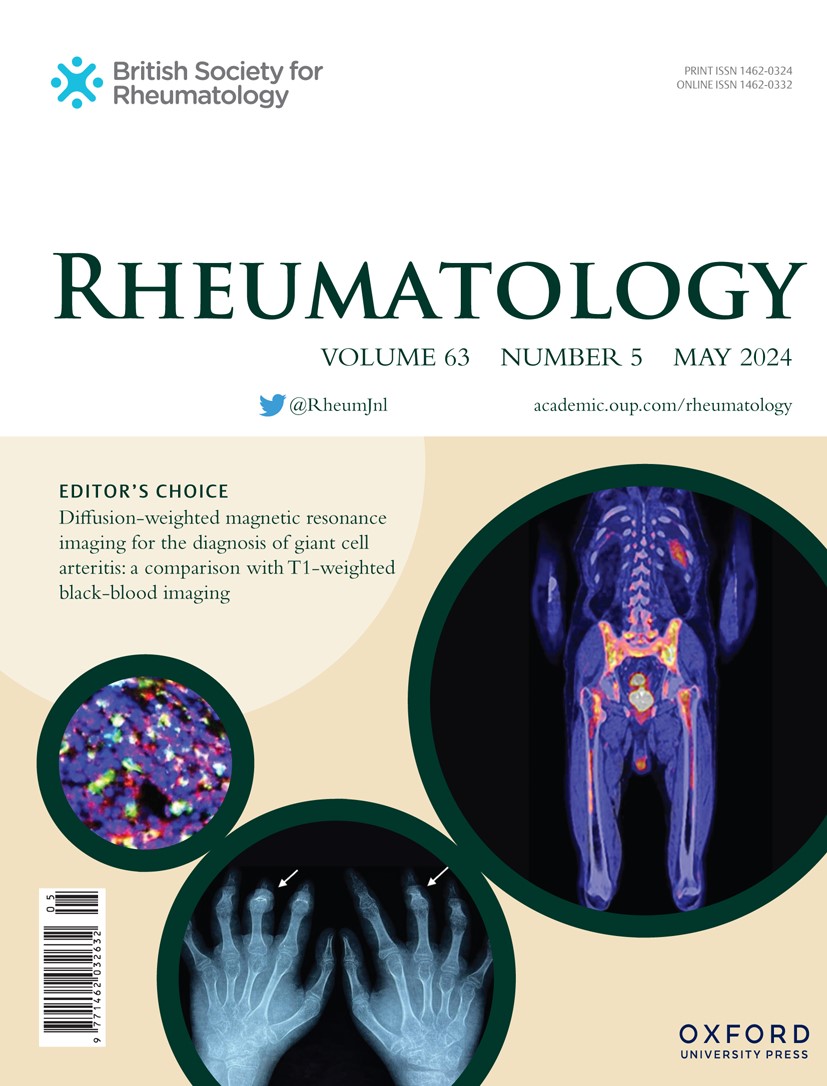Patients’ experiences of managing their rare rheumatic disease
IF 4.7
2区 医学
Q1 RHEUMATOLOGY
引用次数: 0
Abstract
Objectives The rare autoimmune rheumatic diseases (RAIRDs) include systemic lupus erythematosus (lupus), systemic vasculitis, inflammatory myositis, systemic sclerosis, and Sjögren’s Disease. The objective of the study is to understand patients’ experiences of living with and managing their RAIRD. Methods Participants from the UK with a range of RAIRDs were recruited via social media including patient charity networks. Purposive sampling was used to include a range of participants with different conditions and demographic characteristics. A topic guide was developed with patient partners to guide discussions about health-related quality of life with RAIRDs, including support needs. Focus groups were conducted via online video conferencing, audio-recorded, transcribed, checked and anonymised. Data was analysed thematically by an academic psychologist and rheumatologist. Results Twenty-six patients with RAIRDs participated in six focus groups (between 3–6 people per focus group). The median age was 62 years (range 34–82), 21 (80%) were female, 21 (80%) had a diagnosis longer than the last two years. Five themes were identified: managing healthcare systems and health professionals; luck of the draw: variation in access and resources; trustworthy and reliable sources of support; support to live well: core care or an added extra; and dealing with the emotional fallout. Conclusion This study found that patients shared experiences regardless of their specific RAIRD suggesting that a combined intervention could meet their common support needs. Further large-scale work is required, including people who may not usually take part in research, to explore the potential content and structure of such an intervention.病人治疗罕见风湿病的经验
目的罕见的自身免疫性风湿病(RAIRDs)包括系统性红斑狼疮(狼疮)、系统性血管炎、炎症性肌炎、系统性硬化症和Sjögren病。该研究的目的是了解患者与RAIRD一起生活和管理他们的经历。方法通过包括患者慈善网络在内的社交媒体招募来自英国具有一系列raird的参与者。采用有目的抽样,包括不同条件和人口统计学特征的一系列参与者。与患者合作伙伴制定了一份主题指南,以指导与raird讨论与健康有关的生活质量,包括支持需求。焦点小组通过在线视频会议、录音、转录、检查和匿名进行。一位学术心理学家和风湿病学家对数据进行了专题分析。结果26例RAIRDs患者参加6个焦点组(每个焦点组3 ~ 6人)。中位年龄为62岁(34-82岁),21例(80%)为女性,21例(80%)诊断时间超过过去两年。确定了五个主题:管理卫生保健系统和卫生专业人员;抽签的运气:机会和资源的变化;值得信赖和可靠的支持来源;生活保障:核心护理或额外补助;还要处理情绪上的影响。结论本研究发现,无论患者的具体RAIRD如何,他们都有共同的经历,这表明联合干预可以满足他们共同的支持需求。需要进一步的大规模工作,包括那些通常不参与研究的人,来探索这种干预的潜在内容和结构。
本文章由计算机程序翻译,如有差异,请以英文原文为准。
求助全文
约1分钟内获得全文
求助全文
来源期刊

Rheumatology
医学-风湿病学
CiteScore
9.40
自引率
7.30%
发文量
1091
审稿时长
2 months
期刊介绍:
Rheumatology strives to support research and discovery by publishing the highest quality original scientific papers with a focus on basic, clinical and translational research. The journal’s subject areas cover a wide range of paediatric and adult rheumatological conditions from an international perspective. It is an official journal of the British Society for Rheumatology, published by Oxford University Press.
Rheumatology publishes original articles, reviews, editorials, guidelines, concise reports, meta-analyses, original case reports, clinical vignettes, letters and matters arising from published material. The journal takes pride in serving the global rheumatology community, with a focus on high societal impact in the form of podcasts, videos and extended social media presence, and utilizing metrics such as Altmetric. Keep up to date by following the journal on Twitter @RheumJnl.
 求助内容:
求助内容: 应助结果提醒方式:
应助结果提醒方式:


